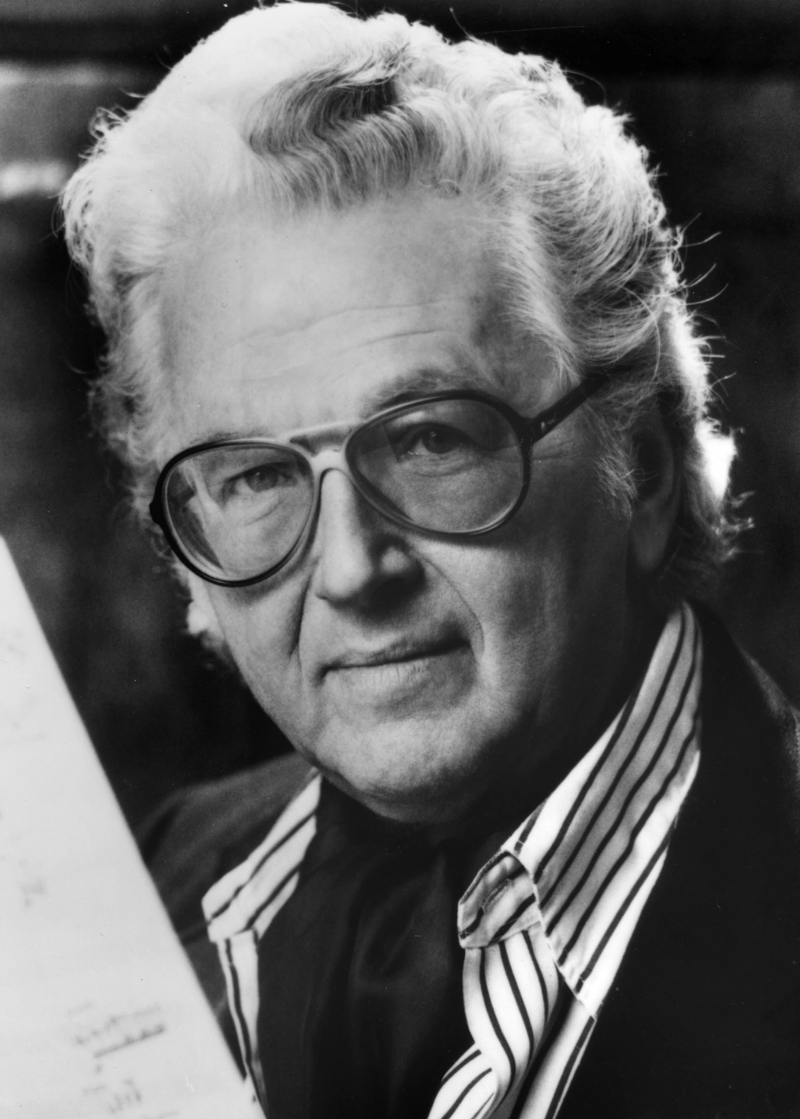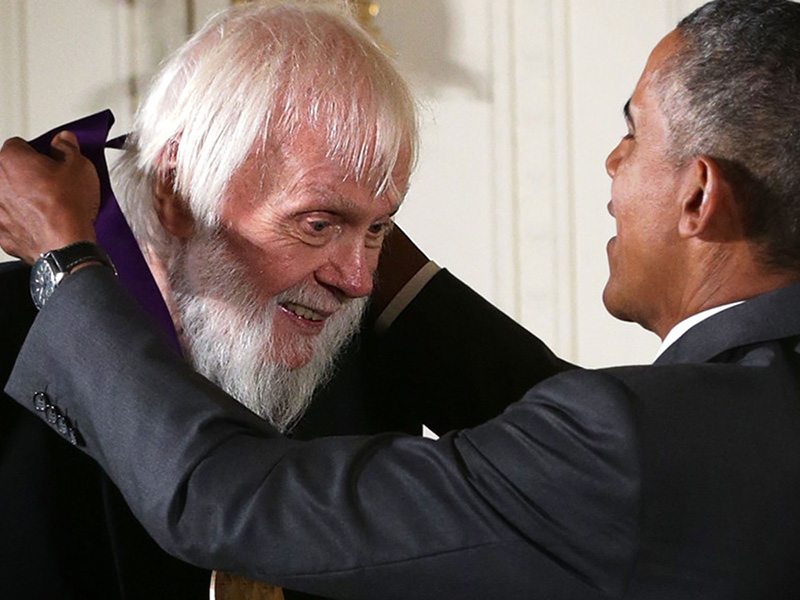|
|
Founding Dean, CalArts School of Music

Click image to enlarge The short story: Benny Goodman's wartime piano player went on to become the Pulitzer Prize-winning founder of the Music School at California Institute of the Arts (CalArts) in Valencia. Mel Powell was born Melvin D. Epstein on Feb. 12, 1923, in the Bronx, to Russian Jewish parents. He started playing piano at age 4, and by 14 he was playing professionally in New York. In 1941, still a teenager, he changed his surname to Powell upon joining the Benny Goodman orchestra as a pianist and arranger. Two years later he was drafted into the Army and was assigned to Glenn Miller's Army Air Force Band from 1943 to 1945 (Miller disappeared Dec. 15, 1944). After the war he moved to Hollywood and worked on and off with Goodman and others, including Louis Armstrong, until late in the decade when he developed muscular dystrophy and couldn't travel. He turned to composing and studied at Yale with German-born composer Paul Hindemith, graduating in 1952. He taught at Queens College in New York City before returning in 1958 to Yale, where he succeeded Hindemith as chair of the composition faculty and director of one of the nation's first electronic music studios. He spent the 1960s exploring experimental musical textures and composed everything from electronic music to orchestral and choral pieces – while still sitting in on some of Goodman's recording sessions. In 1969 the first president of CalArts, Robert W. Corrigan (who had been dean of New York University's School of the Arts), and CalArts' first provost, Herbert Blau (formerly co-director of the Lincoln Center Repertory Company), started recruiting talent to head the six schools: Art, Critical Studies, Design, Film, Music, and Theater & Dance. They tapped Powell to serve as dean of the Music School — a position he held until 1978 — and rounded out the faculty with some of the most innovative and unorthodox voices in the arts, including sitar guru Ravi Shankar. CalArts accepted its first students in 1969, conducted its first year of classes in 1970-71 at an interim campus in Burbank while the Valencia campus was under construction, and moved into the new campus with more than 650 students in the fall of 1971. Powell served as provost from 1972 to 1976. Meantime, he stayed in touch with his old bandleader; this writer first met Benny Goodman in the late 1970s when Powell invited him to CalArts for an afternoon duet of selections from Hindemith's and Powell's own clarinet concertos. In 1987 Powell was commissioned to compose a piece for the Los Angeles Philharmonic. It took him two years to weave together an array of divergent musical influences into "Duplicates: A Concerto for Two Pianos and Orchestra." After it premiered Jan. 26, 1990, Los Angeles Times critic John Henken called it "large in dimension and ambition, and uncompromising in the atonal complexity of its thought and deed," but he thought it wasn't "completely successful in the initial effort." Others were more impressed. Without Powell's knowledge, L.A. Philharmonic conductor Andre Previn submitted "Duplicates" for the 1990 Pulitzer Prize in Music. It won. Being a West Coaster, "far away from the whole Eastern establishment to which the Pulitzer is connected," Powell told the L.A. Times he was surprised. Powell continued to teach at CalArts and held the Roy E.Disney endowed chair in music composition at the time of his death from liver cancer on April 24, 1998, at his home in Sherman Oaks. He was survived by his wife (TV actress Martha Scott), two daughters and a son, and is buried in the Masonic Cemetery in Scott's hometown of Jamesport, Mo. Scott died in 2003 at age 90 and is buried with him. Today the Mel Powell Chair is one of four honorary, endowed chairs in CalArts' Herb Alpert School of Music. — Leon Worden, 2013
LW2305: 9600 dpi jpeg from 300 dpi jpeg. Online image only. |
Ed Fella, Graphic Design
Mel Powell, Music Dean & Provost
Charlie Haden, Jazz Studies Founder
Allan Sekula, Photography
Leo Hobaica, Character Animation
Fran Bennett, School of Theater
Mark Trayle, Sound Artist
John Baldessari Studios Dedicated 3/10/2015
Baldessari: National Medal of Arts 2015
Baldessari Obituary 2020
Ravi Rajan 2020
|
The site owner makes no assertions as to ownership of any original copyrights to digitized images. However, these images are intended for Personal or Research use only. Any other kind of use, including but not limited to commercial or scholarly publication in any medium or format, public exhibition, or use online or in a web site, may be subject to additional restrictions including but not limited to the copyrights held by parties other than the site owner. USERS ARE SOLELY RESPONSIBLE for determining the existence of such rights and for obtaining any permissions and/or paying associated fees necessary for the proposed use.










